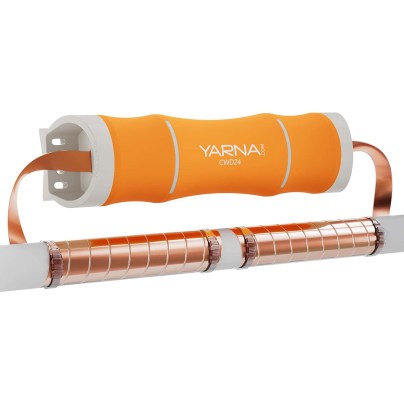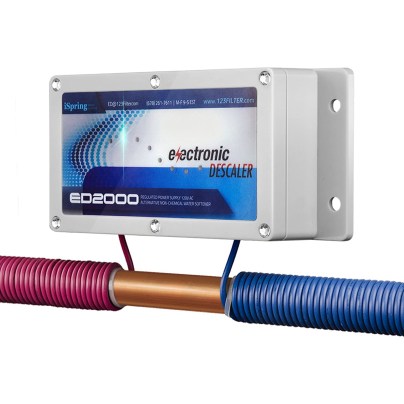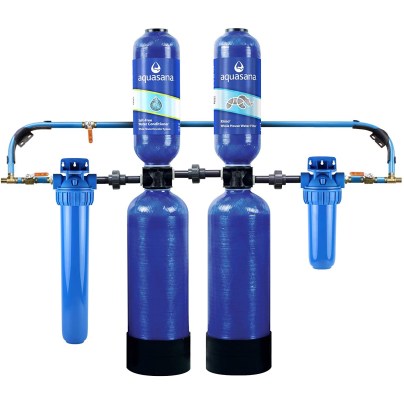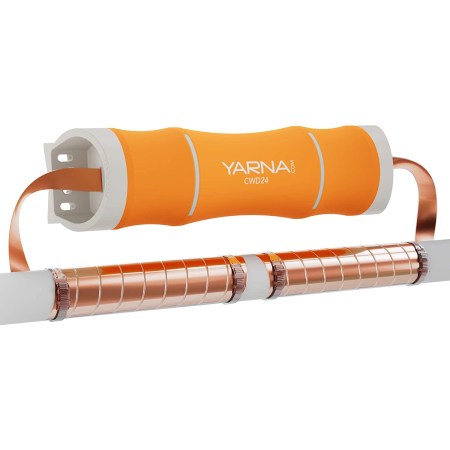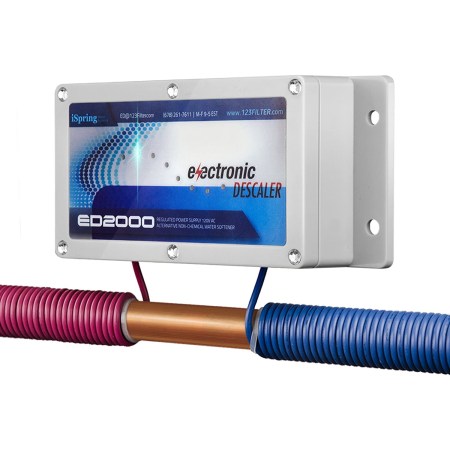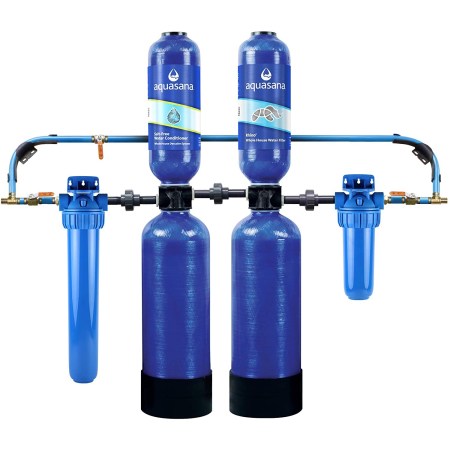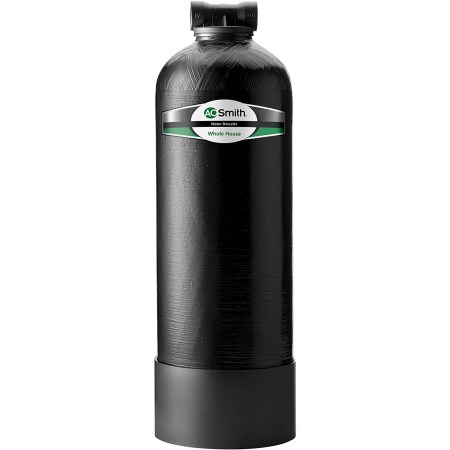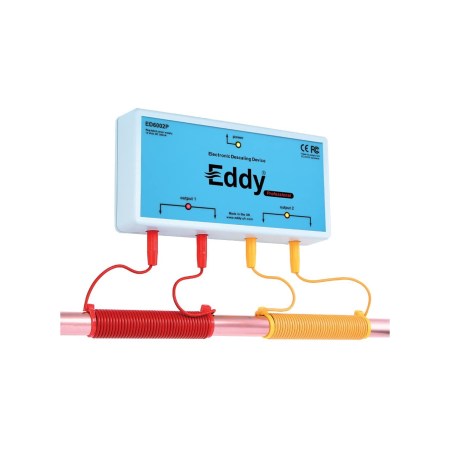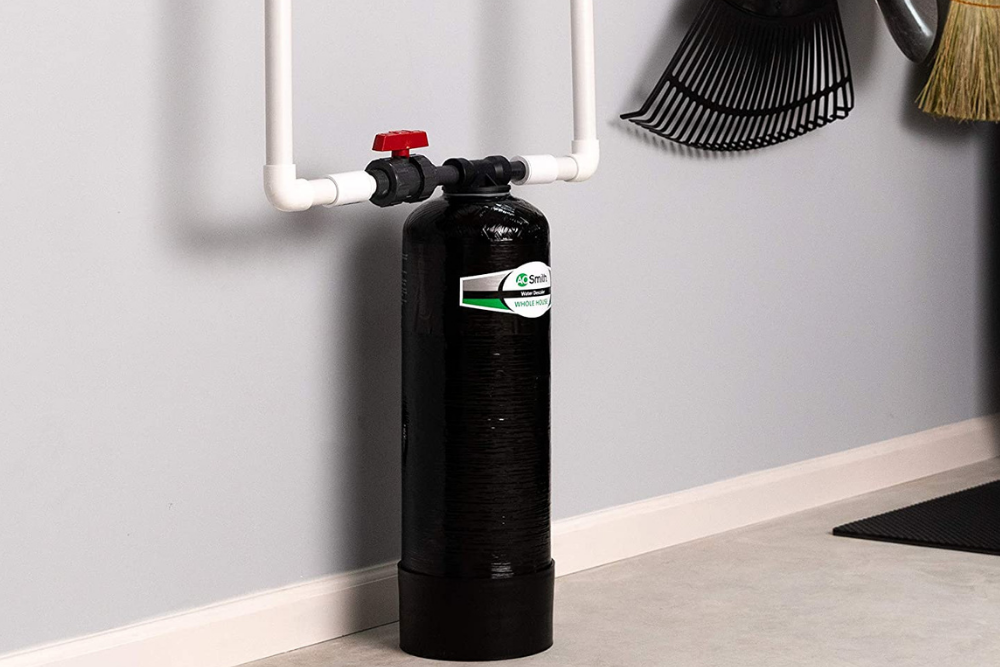
We may earn revenue from the products available on this page and participate in affiliate programs. Learn More ›
Whether on well water or city water, many households struggle with hard water—which can cause scaling and clogged water lines. Traditional salt-based water-softening systems are an effective means of removing contaminants but can be costly to purchase and maintain. They’re also not an ideal fit for those who must restrict their daily salt intake.
Salt-free water softeners offer an alternative to salt-based water softeners. These softeners use electromagnetic waves or filters to remove contaminants or reshape them so they no longer pose a threat to plumbing. We even asked Roy Barnes, master plumber and co-owner of Service Force Plumbing in Rockville, Maryland, what he thought on the matter and got his expert insight. Saltless water softeners, as the name suggests, don’t require a constant flow of salt, making them easier to maintain and cost-efficient.
We recommended the Yarna Capacitive Electronic Water Descaler System as our best overall pick because of its compact construction, unlimited flow rate, and easy 15-minute installation process. Plus, this option requires very little maintenance compared to its counterparts.
In this guide, we explain how saltless water softeners work, give tips on how to decide which water softener is the best one for your home, and offer a list of product options to choose from.
- BEST OVERALL: Yarna Capacitive Electronic Water Descaler System
- BEST BANG FOR THE BUCK: iSpring ED2000 Whole House Water Descaler
- UPGRADE PICK: Aquasana Rhino Whole House Water Conditioner & Filter
- BEST WHOLE-HOUSE: AO Smith Whole House Salt-Free Descaler
- BEST ELECTRIC: Eddy Electronic Whole House Water Descaler

Before You Buy a Salt-Free Water Softener
According to Barnes, the term “softener” is a bit of a misnomer: “Water softeners actually eliminate the causes of hard water, mostly calcium and magnesium, and make it ‘un-hard’ (i.e. soft). Salt-free systems don’t actually remove them but seek to mitigate their effects.”
Our research also found that there are significant differences between salt-free and salt-based water softeners. A salt-based water softener uses salt as the vehicle for removing impurities that harden water, preventing the scaling these particles can cause on plumbing while making soap sudsier for bathing, washing dishes, and cleaning clothes.
Salt-based water softeners must also be refilled with salt on a regular basis, roughly 40 to 80 pounds of salt per month, for the softener to work. These softeners also require an electrical connection to power the ionization process that removes impurities from water.
Salt-free water softeners do not use salt or electricity. Unlike salt systems, salt-free systems do not remove particles that cause water to become hard. Instead, they condition the water so these particles cannot build up on faucets and showerheads. While the minerals remain in the water, the conditioning process makes them better for ingesting. For homes with very hard water or more serious issues, such as lead in water, a salt-free system likely isn’t enough to adequately soften the water.
With these factors in mind, the first step before deciding to go with a salt-free water softener is to determine the home’s water quality. This can be conducted with a simple water hardness test kit, which consists of a vial, dropper, and liquid soap.
The test involves filling the vial to a designated line with water, adding drops of soap, and shaking the vial to produce suds. The more drops of soap it takes to produce suds, the harder the water is. Water with 7 to 10.5 grains per gallon is considered moderately hard, while water with more than 10.5 grains per gallon is considered very hard.
How We Chose the Best Salt-Free Water Softeners
When gathering our top picks for water softeners, we found a number of options that were salt-free. We did our research by only considering reputable brands known for their high performance and quality. Our list of the best salt-free water conditioners includes both electromagnet and whole-house filtering systems, each with its own benefits. The smaller, and usually more budget-friendly electromagnetic filters are very simple to install and require little to no maintenance.
For those looking for a more heavy-duty solution, we have also included our top picks for whole-house filtration systems that, in addition to softening water, can also filter out other common water contaminants. These larger salt-free water conditioners may require professional installation but are worth the investment for those living in areas with particularly hard water.
Our Top Picks
We narrowed down a range of products to our list of top picks, each with its own thoroughly vetted pros and cons. Here are the best salt-free water conditioners for softening water that are effective and easy to install.
Best Overall
Yarna Capacitive Electronic Water Descaler System
Product Specs
- Type: Electromagnetic
- Size: 6 inches long by 2-inch diameter
- Flow rate: Unchanged, attaches to max 1-inch diameter pipes
What We Like
- Compact and ergonomic unit does not take up a lot of space
- Comes with an installation kit for user-friendliness
- Little to no maintenance is required once installed properly
What We Don’t Like
- Treated water will revert back in 2 to 7 days
- Physical access to a water pipe and 10 inches of pipe space are required for proper installation
An effective design and easy installation process (no plumbing skills required!) make this innovative electronic water descaler from Yarna one of the best options for salt-free water softening. This model features copper bands that wrap around the main water line entering a home.
As the water passes through the wrapped section of pipe, the water softener treats it with electrical impulses that convert particles in the water to crystals. These crystals won’t stick to one another, preventing them from creating the scaling that can build up on pipes and appliances, causing clogs. Installation of their water takes as little as 15 minutes—no tools needed. It does require access to 10 inches of pipe space and will only work with pipes that are a maximum of 1 inch in diameter. This descaler plugs into a standard 115-volt outlet.
Get the Yarna salt-free water softener at Amazon or Yarna.
Best Bang For The Buck
iSpring ED2000 Whole House Water Descaler
Product Specs
- Type: Electromagnetic
- Size: 7 inches wide by 2 inches deep by 3.5 inches tall
- Flow rate: Unchanged
What We Like
- Electromagnetic design minimizes scale buildup and reduces energy consumption
- Great for areas that experience a lot of hard water exposure of 10 to 19 grains per gallon
- Clear instructions provided; the brand specializes in easy, DIY installation for their water softeners
What We Don’t Like
- Requires power source nearby; may not be suitable for some users
A simple design that requires no maintenance makes this affordable descaler an attractive option for protecting plumbing and appliances from harmful scaling. It works by sending electromagnetic impulses through the water as it passes through a supply pipe, rendering the particles incapable of joining together to create the scaling that can clog pipes, ruin appliances, and damage skin and hair.
This system requires no plumbing. Simply wrap the wires around a section of water line entering the home to create a coil that serves as a conduit for the electromagnetic impulses that treat the water, then plug the unit into a standard 115-volt outlet. This system works with homes with hard water of 10 to 19 grains per gallon.
Get the iSpring salt-free water softener at Amazon, Lowe’s, The Home Depot, or SupplyHouse.com.
Upgrade Pick
Aquasana Rhino Whole House Water Conditioner & Filter
Product Specs
- Type: Whole house filtration system
- Size: 46 inches wide by 9 inches deep by 54 inches tall
- Flow rate: 7 gallons per minute
What We Like
- Acts as a whole-house water filtration system as well as a water softener; improveswater quality and hardness
- Removes calcium, lime, iron, mercury, chlorine, and other harsh minerals from water
- Filters last for over 3 months before requiring replacement
What We Don’t Like
- Pricey compared to most other options on this list
- Large construction; professional installation is recommended
While this water softener is a significant investment when compared to other types of water softeners, it also removes many more impurities to improve the overall water quality. It uses carbon and KDF filters to remove calcium, lime, iron, and other minerals that harden water. In addition to softening water, it removes other harmful contaminants such as mercury, chlorine, lead, herbicides, and pesticides, making a home’s water supply softer and healthier.
With a flow rate of 7 to 8 gallons per minute, this water filtration system is well suited to families of four or fewer. It uses two main filters for softening the water to remove contaminants, both of which last about 3 months before needing to be replaced. Installation requires plumbing the system into the main water line that enters the home.
Get the Aquasana salt-free water softener at Amazon, Walmart, or Aquasana.
Best Whole-house
AO Smith Whole House Salt-Free Descaler
Product Specs
- Type: Whole house system
- Size: 30 inches tall by 9.25-inch diameter
- Flow rate: 7 gallons per minute
What We Like
- Made with a sediment filter, central water filter, post-filter, and ultraviolet (UV) filter
- Little maintenance is required after installation; lasts for over 600,000 gallons or up to 6 years
- Ideal for families or larger households of up to 4 people
- Affordable for a whole-house water softening system
What We Don’t Like
- Professional installation is recommended; may be tricky for a DIYer
Buying replacement filters every few months to maintain soft water in a home can be a pain. This whole-house water softener is one of the lowest-maintenance options on the market. It installs easily into existing plumbing and requires no electricity or filter changes. It installs on the main water supply of the house and descales the water through a series of filters as it flows through, preventing buildup on faucet, sinks, showers, and appliances.
This descaler lasts for 600,000 gallons, which equates to about 6 years for a family of four. This descaler can work on its own or combined with AO Smith’s whole-home system, which also includes a sediment filter, central water filter, post-filter, and UV filter.
Get the AO Smith salt-free water softener at Amazon or Lowe’s.
Best Electric
Eddy Electronic Whole House Water Descaler
Product Specs
- Type: Electromagnetic
- Size: 6.75 inches wide by 1.5 inches deep by 3.5 inches tall
- Flow rate: 10 gallons per minute
What We Like
- Consistently changes the composition of deposits to prevent scaling
- Compatible with pipes of up to 1.5 inches in diameter
- Easy installation and maintenance; no plumbing required
What We Don’t Like
- Does not improve water quality; will not remove or filter other water pollutants
- Requires a 115-volt outlet for proper functionality; may not work for some users
With a design that’s low maintenance yet effective, the electronic water descaler from Eddy is a good solution for those dealing with deposits clogging faucets, pipes, and appliances. This descaler consists of two wires that wrap around the main supply line entering the home. The wires create an electromagnetic field that changes the composition of deposits that cause scaling, rendering them incapable of sticking to one another or surfaces.
Unlike other water-softener types, this descaler won’t affect the flow rate of water into a home. It can treat up to 10 gallons of water per minute. This descaler works with pipes up to 1.5 inches in diameter. It’s easy to install, with no plumbing required, and plugs into a standard 115-volt outlet.
Get the Eddy salt-free water softener at Amazon or Walmart.
Jump to Our Top Picks
What to Consider When Choosing a Salt-Free Water Softener
Understanding how the different types of salt-free water softeners work, as well as how much water they can treat on a daily basis, is integral to purchasing the right unit. Below, learn more about the important features of salt-free water softeners.
Type
There are several types of salt-free water softeners on the market, each with their own pros and cons. These types include polyphosphates, electromagnetic and magnetic, and full filtration.
Polyphosphates
The use of phosphates to soften water is a practice that dates back nearly 200 years. Instead of removing impurities from the water, this process conditions the water so impurities cannot create scaling on plumbing or faucets using a filtration cartridge. This type of system is used primarily in restaurants and other commercial settings to protect appliances from scaling.
Electromagnetic and Magnet
Similar to other salt-free water softeners, electric magnetic softeners do not remove particles that cause hardness in water but rather conditions them. They soften water by magnetizing the grains, which prevents them from clinging to surfaces and causing scaling. These systems plug into a standard outlet and don’t need to be plumbed into a home, making them an attractive low-maintenance option for softening water. Magnetic models perform the same task but don’t need electricity and require little to no maintenance. However, they are not as powerful and are only suitable for small homes.
Full Filtration
Full filtration systems not only soften water, but they also remove other contaminants in drinking water. This type of salt-free water softener functions by passing the water through a filter that crystallizes minerals, preventing them from sticking to one another and creating the scaling that can damage pipes and appliances. They also remove other contaminants, including herbicides, bacteria, viruses, pesticides, and chlorine. Filters on these water softeners can be pricey and typically last 6 months to 1 year.
Size and Water Usage
Salt-free water softeners come in different sizes to meet the needs of different households. Determining which size a household needs depends on usage and hardness.
The average person uses 75 gallons of water per day. Therefore, determining water usage is as simple as multiplying the number of people in a household by gallons per day. For example, a family of three will use an average of 225 gallons of water per day.
Use water hardness, expressed in grains per gallon, and water usage to determine what size water softener is needed. Multiply the water hardness by the water usage in the home. For example, a home that uses 225 gallons of water per day with a water hardness of 10 grains per gallon requires a water softener with a capacity of 2,250 grains per day.
Flow Rate
A salt-free water-conditioning system functions between the main water line that enters a home and all of the water receptacles in a home, treating the water as it flows into the home’s plumbing. Salt-free systems that use filtration can affect the flow of water, potentially slowing it. Electromagnetic water treatment systems aren’t plumbed into a home’s water system, so they don’t affect a home’s flow rate. With that in mind, the water softeners with filtration systems must have a flow rate that meets the demands of the household to prevent a drop in water pressure.
The average household, homes with one to three bathrooms, requires a filtration system with a flow rate of between 8 and 12 gallons per minute. Larger households require around 15 gallons per minute.
Installation
One of the main advantages of a salt-free water softener is that they’re much easier to install than saltwater softener systems. While the latter typically requires professional installation, a salt-free system is typically an easy DIY job. Electromagnetic salt-free water softeners don’t require any plumbing and typically take about 15 minutes to install. This type of water softener has wires that wrap around the water supply pipe with a power source that sends electromagnetic waves through the wire.
Full filtration systems and whole-house systems are more involved as they need to be attached to the incoming water supply pipe but are still relatively quick and easy to install.
The Advantages of Using a Salt-Free Water Softener
Salt-free water softeners offer an alternative and many advantages over traditional salt water softeners. Below, learn more about how salt-free water softeners can benefit the water in your home.
- They’re healthier: Unlike traditional water softeners, salt-free water softeners do not use any sodium chloride. This means they won’t add any salt to drinking water. This can be a significant benefit if members of the household must limit their salt intake due to high blood pressure or other health issues.
- They’re low maintenance: Unlike traditional water softeners, which must be refilled with 40 pounds or more of salt each month and periodically cleaned, salt-free water softeners require very little maintenance. While some units have filters that must be replaced every 3 to 6 months, electromagnetic models require little to no maintenance at all.
- They have low operating costs: Since salt water softeners require a steady stream of salt to work and use electricity to create the ionization process that softens water, they have an ongoing cost after the initial investment to purchase the system. Salt-free systems do not use salt or electricity, which helps to save money.
- They protect plumbing and appliances: Like salt-base water softeners, salt-free water softeners remove or alter the impurities in water, eliminating scaling that can clog pipes while optimizing the performance of washing machines, hot water heaters, and dishwashers.
FAQs
If you still have questions about how salt-free water softeners work or are wondering if your new water softener is working properly, then read on for answers to some of the most commonly asked questions about these appliances.
How a water softener works varies depending on the type. All water softeners work by treating the water as it enters the home. Some softeners filter out minerals that cause water to be hard, while others reshape these minerals from water so they cannot accumulate to create scaling on water fixtures.
Salt-free water softeners remove small amounts of iron from water; however, they’re not equipped to deal with high levels of iron. In these cases, it’s best to go with a traditional water softener.
A water softener should prevent deposits from building up on faucets and in sinks and toilets. It should also take less soap and shampoo to create suds when bathing. For a more scientific approach to determining how effective a water softener is, use a simple water hardness test kit.
Most salt-free water softeners require no cleaning at all. Filter-based water softeners are enclosed and require no cleaning. Simply replace the filter when it expires. Electromagnetic water softeners with coils that fit around pipes are fairly maintenance-free. Occasionally check the unit to make sure dust and dirt are not accumulating around the coils. If so, vacuum away any dirt.
This depends on the type of salt-free water softener. An electromagnetic water softener can last up to 40 years or more, while an enclosed filter-based water softener may last up to 6 years before needing replacement.
